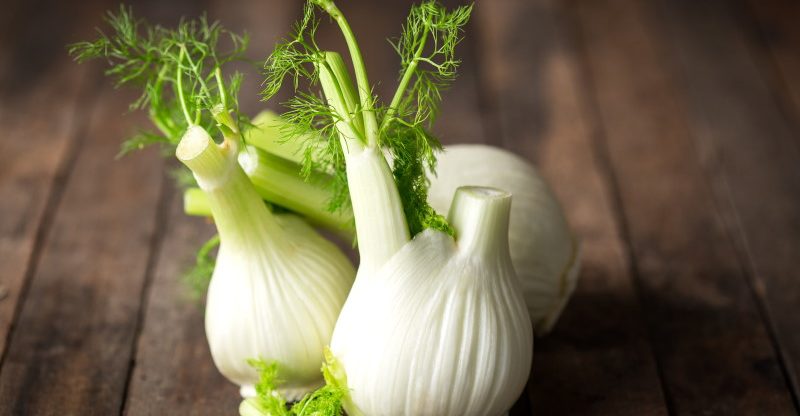16 Evidence Based Benefits of Fennel
While you may have eaten fennel before or used fennel seeds in your cooking, you may not know that this plant, which is entirely edible, has a long history of keeping humans healthy and strong.
Not only is fennel a trusted cure for stomach problems, it also lowers inflammation, improves PMS and other menstrual symptoms, and can help improve your mood and memory.
Fennel has a long and proud history in herbal medicine, including in Ayurveda, Traditional Chinese Medicine, and by the ancient Greeks.
Today, it is widely available for use to improve your heart health, help promote milk production, and much more.
Keep reading to learn of the many health benefits of this ancient and flavorful plant.
Understanding Fennel
The fennel plant, known botanically as Foeniculum vulgare, is in the same family of vegetables as celery, carrot, and parsley.
Not only can you eat the fennel bulb, but the green tops of this plant are an aromatic herb that has been used for centuries in medicine and the seasoning of food.
Herbalists and traditional healers around the world have used fennel for treating many different maladies and ailments.
One if its most prized uses is to treat stomach problems, but fennel has also been relied on to help treat colds, fevers, colic, and to improve lactation (1).
The active compounds in fennel that make it so useful include an antimicrobial known as anethole, flavonoids, terpenes, and phenolic compounds.
You can also find many essential vitamins and minerals in fennel, including Vitamin C and several B vitamins as well as A, E, and K.
To round out the nutritional profile of this plant, fennel also contains many trace minerals as well as amino acids.
The Parts of the Fennel Plant
Fennel is a plant that resembles bulbous celery and tastes like licorice and smells like anise.
It is widely used in Mediterranean cuisine, where it originated.
Above the bulb, you will find feathery leaves as well as yellow flowers.
Everything on the fennel plant is edible, including the seeds, leaves, bulb, and stalk.
The fennel bulb can be chopped and eaten raw or cooked.
This part of the plant is rich in bioflavonoids, tannins, and phenolic acids that provide health benefits while also giving texture and exciting flavor to dishes.
The seeds of the fennel plant are rich sources of antioxidants, and it is from these parts of the plant that fennel essential oil is made.
Fennel is high in dietary fiber, with one bulb supplying about 30 percent of your daily fiber needs.
The fennel bulb is also very high in potassium, which is vital for regulating fluid balances and blood pressure.
Fennel in Herbal Medicine
Cultures around the world have traditionally used fennel in their healing practices.
Traditional Chinese Medicine (TCM) uses fennel to improve milk production in women who are breastfeeding, to calm upset stomachs and sore throats, and to reduce congestion.
In Ayurveda, fennel is believed to help balance the various body types by nourishing the brain and eyes.
In this tradition, it is used frequently for digestive problems.
Fennel is an integral part of many other medical and healing systems, and even today, herbalists around the world rely on this plant for its many healing properties.
Fennel’s Flavor “Cousins”
Fennel’s flavor is often compared to that of licorice or anise, which is not surprising because all these plants contain anethole, the compound that is responsible for the aroma and flavor of these herbs.
Anise is most commonly used as a spice.
While anise seed and star anise may sound like they should be related, they are not.
What they do have in common, though, is anethole.
This provides the sweet and distinctive flavor and scent of these two spices.
Anise is used in traditional medicine to fight infections, improve cardiac health, relieve depression, treat PMS, and regulate glucose levels.
Licorice has many of the same applications in herbal medicine as anise, as it possesses the same anti-inflammatory properties and antioxidants as the plants that share its flavor profile.
Licorice is used in TCM as well as Ayurveda for its ability to improve respiratory problems and improve adrenal function.
Using Fennel
Fennel can be used in many different forms, from tea to capsules to essential oil.
In clinical studies using capsules, doses up to 100 milligrams three times per day have been found to be safe (2).
When taken as a tea, you can drink one cup one to three times per day to enhance digestion, as needed.
Fennel’s Health Benefits
Fennel is Rich in Antioxidants
Quercetin and caffeoylquinic acid are among the many other flavonoids and phenolic compounds that provide antioxidant support for your body (3).
These compounds help to increase the activity of antioxidant enzymes within your cells, including superoxide dismutase and catalase (4).
Fennel Supports Digestive Health
One of the most popular and common uses of fennel is to treat various digestive problems.
Many enjoy fennel for relieving excess gas, constipation, and stomach pains as well as treating diarrhea.
Fennel seeds can be chewed to increase blood flow and bile production in the digestive system and to soothe intestinal spasms (5).
The anethole in fennel enhances digestion and improves stomach emptying, which can relieve dyspepsia (6).
Fennel can be used to help treat various chronic illness, too, including Irritable Bowel Syndrome (7).
Fennel Fights Infections
When tested in cell studies, fennel extract was proven to inhibit many different pathogens, including E. coli, Salmonella, and staph bacteria (8, 9).
In addition to protecting against bacteria, fennel can also help stop mold and yeast growth, including Candida albicans and black mold (10, 11).
By killing infections and reducing inflammation, fennel can also improve the healing of wounds.
The herb is even known to enhance the production of collagen, which can boost skin healing, as well (12).
Fennel Lowers Inflammation
By decreasing inflammatory cytokines such as IL-1beta and TNF-alpha, fennel can help reduce inflammation (13).
Excessive inflammation results in pain, redness, swelling, and many chronic conditions, including arthritis, periodontitis, IBS, and many more.
Because it also reduced inflammation in the lungs, it could be used to help treat respiratory illnesses such as COPD and asthma (14).
Your body produces several enzymes that cause the allergic and inflammatory responses that result in these disorders and symptoms, and fennel contains multiple compounds that can inhibit the production of these enzymes (15, 16).
This makes it a useful and promoting treatment for many illnesses, including allergies.
By lowering inflammation, fennel can also help to relieve pain in some cases, as well (17).
Fennel Treats PMS and other Reproductive Disorders
When fennel enters your body, it has similar effects to those produced by estrogen.
Because of this estrogenic influence, fennel can be used to treat several hormone-related problems, including diminished sex drive, menopause, PMS, and much more (18).
For example, fennel was shown to reduce the length of menstrual cycles while also relieving other PMS symptoms in one clinical study (19).
Women reported improved well-being and less nausea with their cycle than the placebo group.
When combined with other supplements, like Vitamin E, fennel can help decrease cramps and pain, as well (20).
For women with intense cramps and significant pain, fennel has been shown to help reduce these symptoms, as well.
The effects are quick-acting, too, with results occurring in as little as 30 minutes (21).
Even when your hormone levels are normal, women may sometimes have excess facial hair growth, and fennel could help to treat this condition, known as hirsutism.
In several studies, a topical application of fennel was shown to reduce the thickness of hair and reduce new hair growth (22, 23).
Menopause can result in many unpleasant symptoms for women, including night sweats, hot flashes, depression, difficulty sleeping, fatigue, and sexual dysfunction.
In a clinical study with 90 participants, fennel effectively reduced the severity of many of these menopausal symptoms without serious adverse effects (24).
Fennel Improves Lactation
While there is no clinical evidence to show that fennel can improve milk production, we have scientific data to explain why this effect could be possible and to support the generations of anecdotal evidence for its use as a lactation aid.
For example, prolactin is the hormone that stimulates milk production, and dopamine is capable of blocking prolactin (25).
The compounds in fennel could be responsible for blocking the dopamine inhibitory actions in the body, thereby improving milk production.
In clinical trials, fennel has been shown to increase prolactin levels (26).
Fennel Treats Colicky Babies
Colic is a disorder in infants that results in excessive crying and distress, often for hours at a time.
No one knows exactly what causes colic, but most doctors agree that the digestive system plays some role in this condition, creating cramps and other problems that cause the baby distress.
Because fennel is so effective at soothing the digestive system and relieving gastrointestinal discomfort, it can also be used to help treat colic.
In a study of 135 infants with colic, oil from fennel seed was found to relieve colic in nearly 70 percent of subjects, which is almost three times as many as in the control/placebo group (27).
Systematic reviews of the scientific literature support these claims, indicating that fennel has effectively treated colic in multiple studies and trials over the past two decades (28, 29).
Fennel Supports Healthy Skin
Fennel is not merely good for your body on the inside.
It can also help improve the health of your skin.
When applied topically, fennel extract has been shown to improve the water content of the skin as well as enhance skin texture (30).
It could also help lighten skin and prevent dark spots caused by UV and age (31).
It could also reduce the signs of aging on the skin, including from sun exposure.
In animal trials, fennel increase collagen and elastin production while improving antioxidant levels (32).
By reducing reactive oxygen production and increasing several vital antioxidants, fennel can fight the aging process and keep skin looking younger longer.
Fennel Relaxes Airway Restriction
By relaxing muscles in the airway, fennel has promise for treating respiratory problems.
In animal trials, it was shown to relax the trachea (33).
Because of its ability to influence dopamine, which also can help to relax respiratory muscles, fennel could change your airflow in multiple ways (34).
Anethole can improve bronchodilation, thereby improving breathing over time.
Fennel Reduces Blood Sugar
For those with diabetes or who are pre-diabetic, fennel could help you to reduce blood glucose levels.
In one animal trial, fennel essential oil lowered glucose levels by half while also minimizing damage to pancreatic and kidney tissues from diabetes (35).
Additional research shows that fennel effectively improves blood sugar levels and cholesterol in animals with diabetes, raising hope that this could be an effective treatment in the future (36).
More clinical research is needed on this topic.
Fennel Promotes Heart Health
Your heart health is crucial to your long-term wellness and longevity.
Many indicators tell you whether your heart is functioning well or is at risk for heart disease.
These indicators include your blood pressure, total as well as HDL and LDL cholesterol levels, triglyceride levels, platelet count, and blood sugar levels.
Regarding cholesterol, animal research indicates that fennel extract may be able to reduce not only total cholesterol levels but also improve both HDL (good) cholesterol as well as LDL (bad) cholesterol levels (37).
Additional animal trials support the HDL-raising effects of fennel on lipid levels (38).
By reducing blood pressure, fennel may also be able to protect your heart in other ways.
Fennel extract was shown to reduce blood pressure in animal trials (39, 40).
Fennel can lower blood pressure because it contains nitrates, which naturally reduce blood pressure, as well as potassium, magnesium, and calcium, all of which play an essential role in vasodilation while also protecting blood vessels from damage (41).
Fennel can also help to prevent the formation of blood clots, which can lead to stroke and other forms of health damage.
In one animal study, fennel essential oil significantly prevented blood clotting (42).
In addition to these protections, the nutrients and minerals found in fennel are known to improve your overall health as well as protect your heart.
Fennel contains Vitamins C and B6, lots of potassium, and is an excellent course of folate, fiber, and phytonutrients that all support your heart’s health.
Fennel Could Help Treat Cancer
The compounds in fennel could play a role in inhibiting the growth of cancer cells.
In trials using skin and stomach tumor cells, fennel seeds helped to slow the growth of these cells while also increasing the activity of antioxidant enzymes and certain detoxification enzymes (43).
Extract o the fennel seed blocked the growth of both liver and breast cancer cells in another trial (44).
In animal trials studying cancer, the survival time and tumor weight were both improved in subjects who took fennel seeds (45).
The anethole in this herb can help stop prostate cancer, as well (46).
Fennel Boost Mood and Enhances Cognition
Fennel could also be used to improve mood and boost cognition in some cases.
After menopause, depression and anxiety are common symptoms for some women, and fennel can improve these conditions for some sufferers (47).
It has also shown efficacy in animal trials for reducing generalized anxiety (48).
Acetylcholine is vital for proper memory function, and fennel can boost the acetylcholine levels by stopping enzymes (49) and drugs (50) that breakdown this critical neurotransmitter.
Fennel Protects Organ Function
Your liver and kidneys play important roles in your overall health and welfare.
By decreasing levels of certain enzymes and compounds known to cause liver and kidney damage, fennel essential oil can help to protect these vital organs and keep them working correctly (51, 52).
Fennel Reduces Appetite
Because of its high fiber content, fennel could help reduce appetite while increasing satiety, thus leading to increased weight loss.
Research shows that eating a high fiber diet can help you to effectively lose weight by adding few calories but lots of bulk to your meals (53).
This fills up your stomach longer, causing you to consume fewer calories over time.
Fiber is also crucial for your heart and colon health, as well.
In one study, healthy overweight women who drank fennel tea also had reduced hunger and improved satiety (54).
Perhaps the compounds in fennel trigger hormones that reduce appetite as well.
More research is needed to understand this connection.
Fennels Helps with Bone Health
The compounds in fennel seeds can help to prevent bone loss, which improves mineral content and density within your bones, thus preventing osteoporosis (55).
Some conflicting evidence exists on this topic, so further research is needed to understand the effects of fennel on bone health.
Precautions and Interactions
Fennel is generally well tolerated and produces few adverse effects, especially with short-term use.
The most common side effects are nausea, allergies, and a slight increase in menstrual flow (56).
When taken in larger doses or for extended periods, reactions could include arrhythmia and trouble breathing.
If you are allergic to plants that are related to fennel, you may also find that you have an allergy to this plant.
Anyone allergic to celery, carrot, or mugwort should use caution when taking fennel to observe for an allergic response (57).
Anyone who handles this plant frequently, such as farm workers or choose, should use caution when handling fennel for prolonged periods (58).
Because fennel slows the clotting of blood, it could delay wound healing or result in excessive bleeding if taken with a blood thinner or by those with a bleeding disorder (59).
In people with epilepsy, fennel can induce seizures (60).
Because fennel mimics estrogen in the body, those with certain estrogen-sensitive conditions should avoid using it as a supplement.
This includes anyone with a history of uterine fibroids, endometriosis, or cancer of the breast, uterus, or ovaries.
In younger children who have not begun puberty, taking fennel can result in the premature development of breasts (61), but this side effect stops once the fennel supplement with withdrawn.
While there is no medical evidence to support these claims, there are some who believe the fennel can cause problems during pregnancy, including miscarriages and nerve damage to fetuses.
Because of its ability to mimic estrogen and affects prolactin levels, it should be used with caution by women who are pregnant.
Talk with your doctor before using this supplement.
Fennel has been tested and deemed to be safe for use with infants, but research is limited to short-term applications.
Long-term use of fennel should be under the supervision of a doctor because of its ability to influence hormone levels.
When taken in large amounts, fennel can make your skin more sensitive to the sun, which can lead to skin irritation and problems (62).
Fennel contains a compound that makes the plant more susceptible to UV, and when you consume this, it can have the same effect on your body.
This effect is rare but possible.
Fennel blocks certain enzymes which are responsible for metabolizing many common medications, including beta-blockers, statins, antidepressants, antipsychotics, antibiotics, and opioids.
When you take these medications in conjunction with fennel, the effects of the drug can be more enhanced, giving you unpredictable outcomes.
Talk to your doctor when taking these medications with fennel (63, 64).
Conclusion
Fennel is a plant native to the Mediterranean but which grows in all parts of the world today.
Its bulb, seeds, stems, and flowers are all edible and widely used in recipes from many types of cuisines.
The fennel plant has been a part of many different healing traditions throughout human history, and its historical uses include treating stomach problems, relieving colic, and treating female reproductive problems.
Fennel is available in many forms, including teas, essential oils, extracts, and supplements.
It has a flavor similar to licorice or anise because all these plants share the same compound, known as anethole.
Among fennel’s many health benefits, the most researched and understood include reducing blood pressure and cholesterol, preventing cancer, relieving colic and indigestion, helping your skin and bones to remain healthy, and lowering blood sugar levels.
FDA Compliance
The information on this website has not been evaluated by the Food & Drug Administration or any other medical body. We do not aim to diagnose, treat, cure or prevent any illness or disease. Information is shared for educational purposes only. You must consult your doctor before acting on any content on this website, especially if you are pregnant, nursing, taking medication, or have a medical condition.
HOW WOULD YOU RATE THIS ARTICLE?






